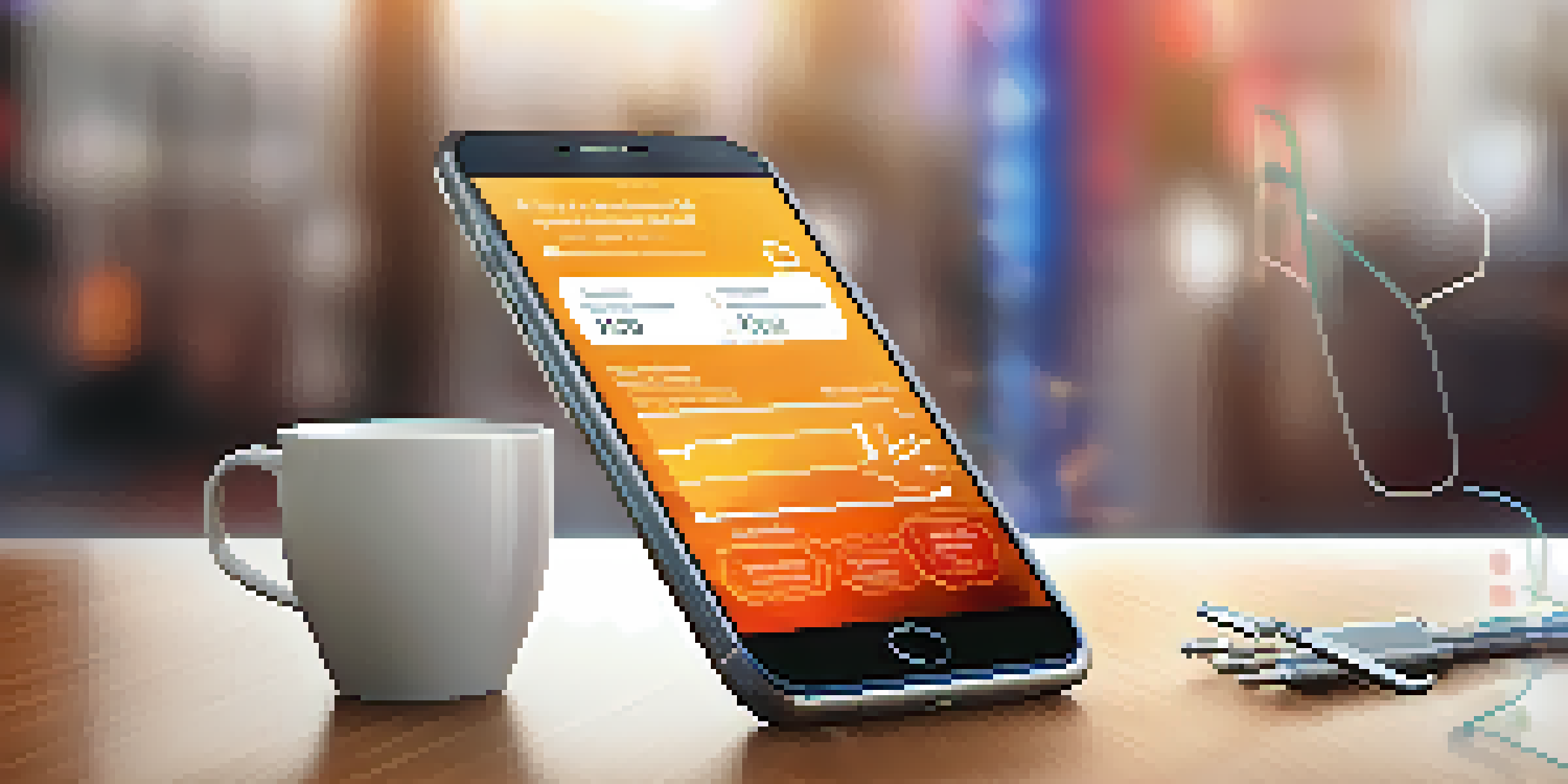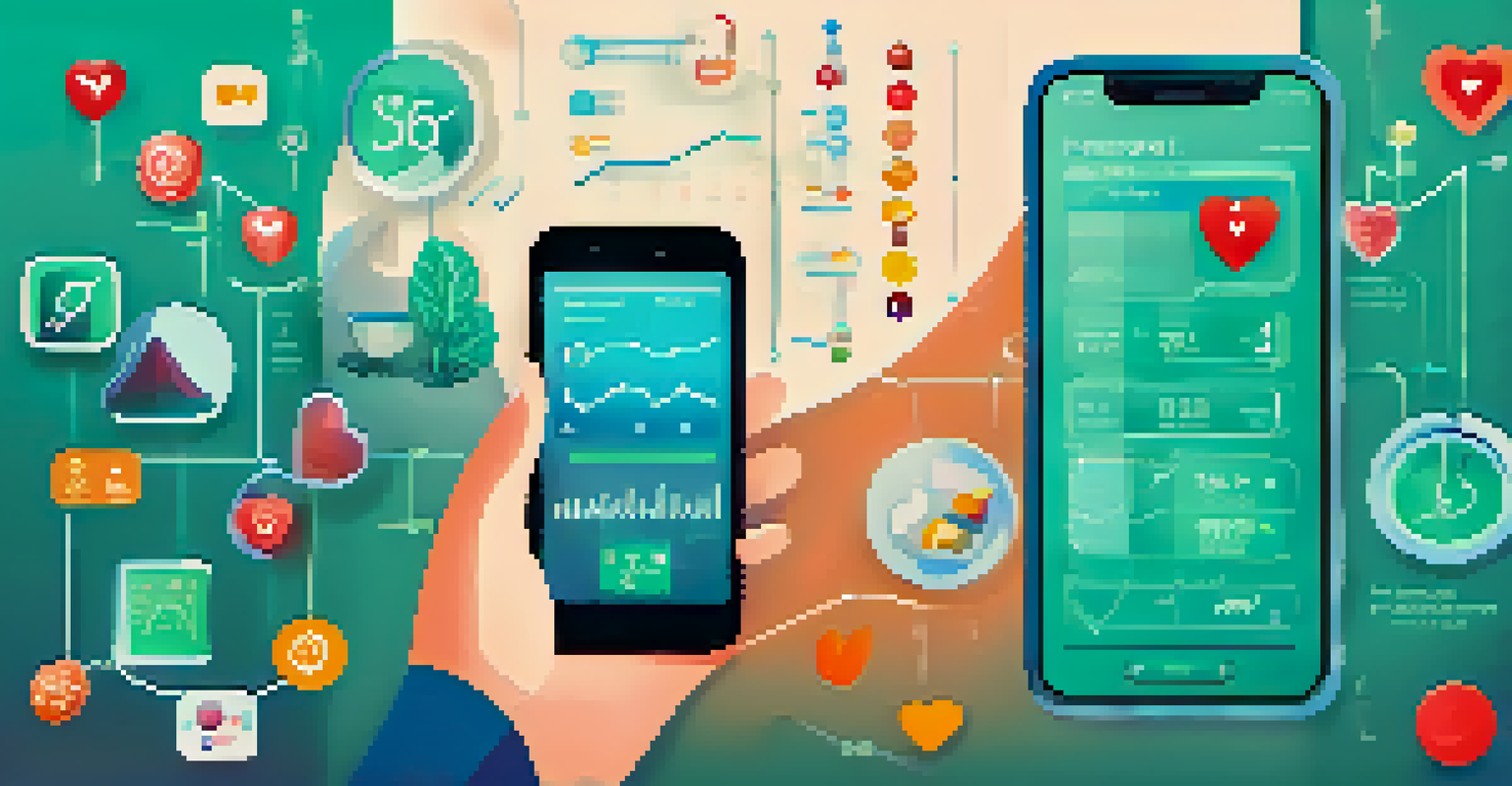The Future of Mobile Health Apps in Patient Empowerment

Understanding Mobile Health Apps and Their Purpose
Mobile health apps, often referred to as mHealth apps, are digital tools designed to help users manage their health and wellness. These applications can track physical activity, monitor chronic conditions, and provide medication reminders, making healthcare more accessible. By centralizing health data on a mobile device, they empower patients to take a proactive role in their health.
The greatest medicine of all is to teach people how not to need it.
For instance, a diabetes management app can help users log their blood sugar levels and receive personalized feedback based on that data. This immediate access to information not only aids in better decision-making but also fosters a sense of control over one's health. In a world where convenience is key, these apps are bridging the gap between patients and healthcare providers.
As technology advances, the potential of mobile health apps continues to grow, promising even more innovative features that can enhance patient engagement. From telehealth consultations to AI-driven health insights, these tools are transforming how patients interact with their health and healthcare systems.
The Role of Patient Empowerment in Healthcare
Patient empowerment is the process of equipping individuals with the knowledge, skills, and confidence to manage their health effectively. This approach shifts the traditional dynamic of healthcare, where patients often feel passive, to one where they actively participate in their treatment and wellness journey. Empowered patients are more likely to adhere to treatment plans and make informed health decisions.

For example, when patients use a health app to track their symptoms, they can better understand their conditions and discuss their observations with their healthcare providers. This collaborative approach not only improves health outcomes but also fosters a stronger patient-provider relationship built on trust and communication. The more informed patients are, the more they can advocate for themselves.
Empowerment Through Mobile Health Apps
Mobile health apps empower patients by providing tools and resources that enable them to take an active role in managing their health.
As healthcare continues to evolve, fostering patient empowerment through technology will be crucial. Mobile health apps are at the forefront of this movement, providing users with tools that support informed decision-making and proactive health management.
How Mobile Health Apps Enhance Access to Health Information
One of the primary benefits of mobile health apps is their ability to provide instant access to health information. Users can easily find resources about various conditions, treatment options, and wellness tips, all at their fingertips. This democratization of information means that patients no longer have to rely solely on their healthcare providers for knowledge.
Technology is best when it brings people together.
Consider a user researching symptoms through an app. They might discover new treatment options or lifestyle changes that can significantly impact their well-being. This newfound access allows for better preparation for medical appointments and encourages patients to ask informed questions, leading to more meaningful discussions with their healthcare providers.
As mobile health apps continue to evolve, we can expect even more features that enhance access to information, such as personalized health content tailored to individual needs. This shift not only empowers patients but also creates a more educated healthcare community.
The Impact of Data Tracking on Patient Outcomes
Data tracking is a core feature of many mobile health apps, allowing users to monitor various health metrics over time. By consistently logging information such as weight, blood pressure, or physical activity, patients can identify patterns and make necessary adjustments to improve their health. This ongoing self-monitoring is key to staying engaged and motivated.
For instance, a user who tracks their daily exercise may notice trends that correlate with their mood or energy levels. Recognizing these patterns can lead to more informed choices about lifestyle changes, ultimately contributing to better health outcomes. This proactive approach not only fosters accountability but also reinforces the idea that patients can take charge of their health.
Community Support Enhances Engagement
These apps foster community connections among users, offering emotional support and shared experiences that motivate individuals in their health journeys.
As mobile health apps incorporate more advanced data analytics and visualization tools, users will become even more equipped to understand their health journeys. This focus on personal data empowers patients to make changes that lead to improved quality of life.
Customization and Personalization in Mobile Health Apps
The future of mobile health apps lies in their ability to offer personalized experiences tailored to individual user needs. By analyzing user data and preferences, these apps can provide customized health recommendations, reminders, and educational content. This level of personalization enhances user engagement, making it more likely that patients will stick with their health app.
For example, a user with a specific dietary restriction may receive tailored meal suggestions based on their preferences and health goals. This not only simplifies the decision-making process but also encourages healthier choices. When users feel that their unique needs are being addressed, they are more likely to remain committed to their health management efforts.
As technology continues to advance, the ability to personalize health apps will only improve, creating a more engaging and effective user experience. This shift towards customization is essential for maximizing the potential of mobile health solutions.
Integrating Community Support Through Mobile Health Apps
Mobile health apps are not just about individual empowerment; they also foster community support among users. Many apps include features like forums, support groups, or social sharing options that connect users facing similar health challenges. This sense of community can significantly enhance motivation and provide emotional support.
For instance, a cancer survivor may find solace in connecting with others who have shared similar experiences through an app's community feature. This connection can lead to the sharing of valuable insights, coping strategies, and encouragement, reminding individuals that they are not alone in their health journeys. This communal aspect of mobile health apps can be a game-changer for those seeking support.
Challenges for Mobile Health Apps
Despite their potential, mobile health apps face challenges such as data privacy concerns and the need for high-quality, user-friendly designs.
As the importance of social support in health management becomes increasingly recognized, the integration of community features in mobile health apps will play a vital role. This collective empowerment can lead to better outcomes and a strengthened sense of belonging.
The Challenges Ahead for Mobile Health Apps
While mobile health apps hold great promise for patient empowerment, they also face significant challenges. Issues such as data privacy, app quality, and user engagement can hinder their effectiveness. Ensuring that user data is secure and private is paramount, as breaches can erode trust in these valuable tools.
Moreover, the sheer volume of health apps available can be overwhelming for users. Not all apps are created equal; some may lack the necessary scientific backing or usability features. As a result, users may struggle to find the right app that meets their needs, leading to frustration and disengagement.

Addressing these challenges will require collaboration among developers, healthcare providers, and users. As the mobile health landscape continues to evolve, focusing on quality, security, and user experience will be essential for maximizing the benefits of these innovative tools.
Looking Ahead: The Future of Mobile Health Apps
The future of mobile health apps is bright, with endless possibilities for enhancing patient empowerment. As technology advances, we can expect to see even more sophisticated features, such as AI-driven insights, predictive analytics, and seamless integration with wearable devices. These innovations will further support users in taking charge of their health.
Additionally, as the healthcare industry continues to embrace digital transformation, mobile health apps will likely become standard tools for patient engagement. This shift will not only empower individuals but also transform healthcare delivery by facilitating more personalized and efficient care.
Ultimately, the ongoing evolution of mobile health apps will play a crucial role in shaping the future of patient empowerment. By harnessing the power of technology, we can create a healthcare environment where patients are informed, engaged, and equipped to manage their health journeys effectively.